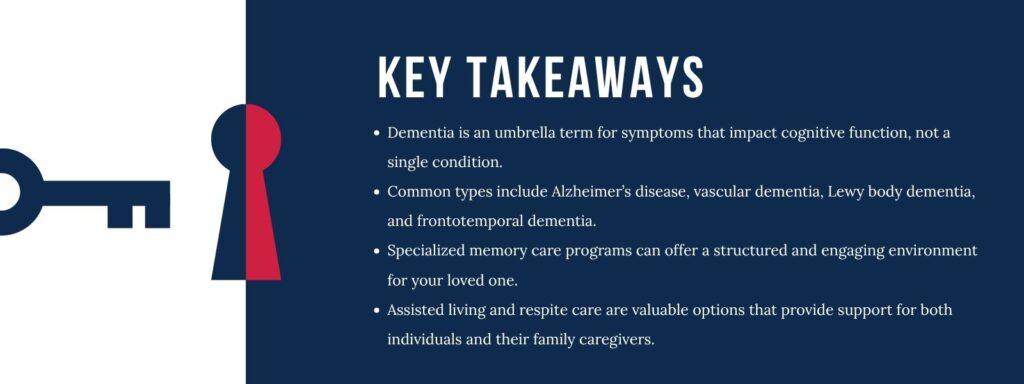When someone you love begins showing changes in memory, communication, or daily routines, it’s natural to worry about what those changes mean. Sometimes, they’re just age-related changes, but sometimes, it’s a little more serious. In some cases, these shifts could be early signs of dementia. However, dementia isn’t one condition—there are many different types, and each has its own unique causes, symptoms, and treatment.
4 of the most common types of dementia include:
- Alzheimer’s disease
- Vascular dementia
- Lewy body dementia
- Frontotemporal dementia
Key Takeaways
- Dementia is an umbrella term for symptoms that impact cognitive function, not a single condition.
- Common types include Alzheimer’s disease, vascular dementia, Lewy body dementia, and frontotemporal dementia.
- Specialized memory care programs can offer a structured and engaging environment for your loved one.
- Assisted living and respite care are valuable options that provide support for both individuals and their family caregivers.
Dementia: What Is It, Exactly?
Dementia refers to a decline in cognitive function that affects memory, reasoning, judgment, or communication. It’s not a normal part of aging, either. It develops when an underlying condition causes physical changes in the brain that lead to a range of cognitive symptoms.
Dementia is also a progressive problem. As the underlying condition develops further, it damages more cells and regions throughout the brain. Eventually, a person living with dementia will likely need round-the-clock care to stay safe in their daily life.
Dementia’s Most Common Risk Factors
Certain factors can increase the likelihood of developing dementia. While not all risks can be controlled, knowing them can help families prioritize early support or medical evaluation.
Common risk factors for dementia include:
- Increasing age
- Family history of dementia
- Cardiovascular concerns or stroke
- Head injuries
- Chronic conditions such as diabetes or high blood pressure
- Lifestyle factors like smoking or long-term inactivity
Each of these can lead to a higher likelihood of developing dementia.
The Most Common Types of Dementia
While there are many types of dementia, a few are more common than others. Each one can affect people in different ways, and sometimes, a person may experience more than one type at the same time.
Alzheimer’s Disease
Alzheimer’s disease is the most well-known form of dementia. It typically appears gradually, often beginning with difficulty remembering recent conversations or appointments. As symptoms progress, people may have trouble with communication, reasoning, or navigating familiar spaces. Behavioral changes may also occur, all stemming from changes in specific areas of the brain responsible for memory and thinking.
Vascular Dementia
Vascular dementia develops when reduced blood flow damages brain tissue. This can happen after a stroke or as part of long-term cardiovascular issues. The early signs often involve changes in judgment, planning, or processing information rather than memory.
With vascular dementia, symptoms may appear suddenly or progress in a step-like pattern. It depends heavily on how the underlying condition affects the brain.
Lewy Body Dementia
Lewy body dementia involves protein deposits that impact both cognitive function and movement. You may notice changes in alertness and attention that can fluctuate from one moment to the next.
When Lewy body dementia is involved, some people experience movement-related symptoms similar to Parkinson’s disease. This type of dementia can cause vivid visual hallucinations that may be confusing or distressing.
Frontotemporal Dementia
Frontotemporal dementia affects the parts of the brain responsible for behavior, decision-making, and language. Because these areas control personality and language, you might see significant changes in your loved one’s behavior or social skills. They may also have increasing trouble speaking or understanding language.

How Specialized Care Can Help Your Loved One
A supportive environment can make daily life more comfortable and predictable for someone living with dementia. Memory care can offer structured days, consistent routines, experienced caregivers, and spaces designed to reduce confusion. These features help residents feel grounded and supported while navigating cognitive changes.
The right memory care community focuses on what a person can do, not what they can’t. They provide hands-on assistance to reduce how much your loved one’s condition affects their daily life. This helps preserve dignity and quality of life, even when dementia is involved.
How to Tell if Someone Needs Memory Care
If you’re not sure if a loved one needs memory care, examine their daily abilities. Look for any signs that they’re struggling with memory or judgment. It helps to watch for:
- Increasing confusion or disorientation in familiar places
- Wandering or exiting the home unexpectedly
- Difficulty managing medications or daily routines
- Frequent agitation, anxiety, or emotional distress
- Changes in personal hygiene or nutrition
- Safety concerns, such as leaving appliances on or doors unlocked
- Difficulty with communication or understanding instructions
Noticing any of these signs can be a signal that additional support may help your loved one stay safe and cared for.
Find a Path Forward with Compassionate Support
Learning about the different types of dementia is a meaningful first step. It empowers you to ask the right questions and look for a community that feels like a good fit for your loved one. It’s an incredible way to plan ahead and make sure your loved one always has the care they need.At All American Assisted Living at Londonderry, our focus is on creating a lifestyle with the right balance of support and independence. Our team is here to offer guidance and compassionate support as you navigate these choices. If you’re exploring memory care options for someone you love, schedule a tour with us today to learn how our community can help.





